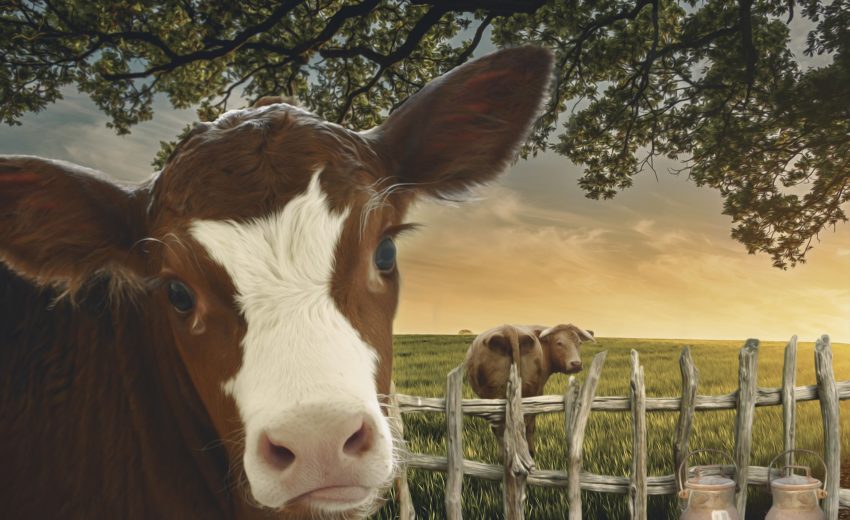
This is a guest post by Vicki Wallshein, a member of Machar: The Washington Congregation for Secular Humanistic Judaism.
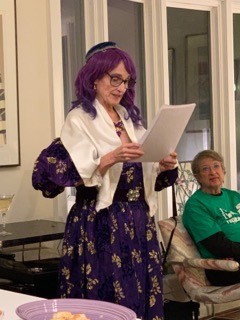
The topic I chose for research was Rosh Hashanah Le Beheimot – The New Years for Animals. Here is my speech. I am hoping that secular Jewish congregations will add this holiday to their yearly calendars. For this year, 5780, Rosh Hashanah Le Beheimot begins at Sunset on August 20th.
November 2, 2019
Rosh Hashanah Le Beheimot: renewing and repurposing an ancient and forgotten Jewish holiday
First of all I want to dedicate this Bat Mitzvah ceremony to my parents. I am fortunate enough to have Mother here but not Daddy, who would have turned 93 tomorrow. So I am going to wear his Bar Mitzvah yarmulke and, since I do not have his tallit, a lovely tuxedo scarf he wore for special occasions. And I have his Bar Mitzvah picture here next to me. My parents never forced religion on me. But when I was in about 9th grade I told them that, even though I was Jewish, I actually did not believe in God and so could no longer go to Temple for services or Sunday school. They were upset with me. Not because I did not believe in God, though: they got upset at me because they were embarrassed and did not know what to tell their friends when they showed up at Temple without their daughter! Already such a cause of tsuris! So I feel pretty comfortable in saying that I was raised in a pretty cultural Jewish household. And we did eat a lot of bacon!
When I decided to become a Bat Mitzvah I knew that my research topic would have to do with Judaism and the treatment of animals. Those who know me will know that I have chosen to practice the Jewish concept of tikkun olam, “repairing the world” (one of the most beautiful phrases I have ever heard) by trying to help stop cruelty to animals, both in my lifetime and after I am gone. But Judaism and the treatment of animals is a very broad subject, it could be a PhD dissertation. So I searched for a topic a little more specific on which I could concentrate and which I could examine from a secular Jewish perspective, since I am a not a religious Jew.
Many Jews know of the holiday called Tu B’Shevat, the Jewish New Year for trees. Some now call it the Jewish Arbor Day or Jewish Earth Day. It was a day initially intended for tithing fruit trees for Temple offerings and was reclaimed in the 17th century by mystics as a day for healing the natural world. You will find it on the holiday calendars of Jewish congregations of all different denominations, certainly on the calendars of secular humanistic congregations like Machar, the congregation to which I belong. Tu B’Shevat takes place yearly in the month of Shevat and will start at sunset on February 9th and run until nightfall on February 10th, 2020 in the Jewish year 5780. It is a pretty minor holiday here but is celebrated as an ecological awareness day in Israel with planting of trees. But I never knew that, prior to the year 70 CE (the supposed destruction of the Second Temple) there was also a holiday called Rosh Hashanah Le Beheimot – the New Year for animals. It also initially had to do with the tithing or counting of farm animals intended for sacrificial offerings. So not exactly a “holiday” for animals!
But I had never heard of this holiday.
I wanted to see if maybe I was missing something. Perhaps this holiday was only left off of Machar’s holiday calendar! After all, we have many vegetarians in our congregation and, like all secular humanistic congregations, we are VERY socially conscious. I decided to go to the website of the Society for Humanistic Judaism, which is the umbrella organization to which my congregation belongs. I then went to the website of each of the other 23 congregations in 15 states and Toronto to see if any of them showed Rosh Hashanah Le Beheimot on their holiday calendars, listed any animal rights activities under their Social Justice or Tikkun Olam Programs or even mentioned the odd animal rights event in a newsletter. Not all congregations shared all this information, of course, but of those that did not one listed the holiday on their yearly calendar or listed animal rights as a social activity program. Occasionally there was a story of some girls who had a bake sale and donated the proceeds to an animal shelter. And a few years ago a Machar student did do her bat mitzvah research topic on Judaism and animals. But there was so little to be found. Or, at least, it wasn’t made evident.
Rosh Hashanah Le Beheimot should take place starting the first of the Hebrew month of Elul, which, in 2019, started at sunset on August 31st and went until nightfall on September 1st. And in 2020 or the Jewish calendar year of 5780 it will begin on Sunset of August 20th and go until nightfall on the 21st. This is a particularly appropriate time of year for this holiday because the 1st of Elul begins the month-long period of introspection during which Jews are to examine their deeds before the high holidays of Rosh Hashanah and Yom Kippur. What better time to raise awareness of the Torah prohibition of tsa’ar ba’alei chayim: the causing of unnecessary suffering or harm to animals. Some 2000 years ago that meant, for example, that farmers couldn’t muzzle an animal while it is threshing (so it may eat some grain), that they had to feed (not fast) their animals on the Sabbath, that they had to rescue a fallen donkey or goat in a ditch even if it belonged to a Gentile! Today many Jews would interpret this phrase as “do not cause suffering that does not advance some legitimate human good”. Of course, the word legitimate is up to much interpretation – especially if you talk to yours truly!
Interesting, though, starting in about 2009, many Reform, Conservative and even Orthodox religious Jewish groups started engaging in activities aimed at minimizing tsar baalei chayim, towards bettering the lives of animals, and even celebrating Rosh Hashanah Le Beheimot with services and Seders. The Jewish Initiative for Animals, Shamayim, of which I am a member, is a group that tries to build Jewish community support for alternatives to factory farming. Most of its members are, I believe, religious. A conservative group called Magen Tedek is addressing tz’ar baalei chayim in the kosher food production industry. The Reform Judaism Central Conference of American Rabbis has said that even though animal research is permitted in medicine if it will help save human lives, the animals must not be subjected to unnecessary pain and must NOT be used in frivolous experiments such as cosmetics (shampoo, household cleansers) testing. A former ultra-Orthodox Sephardic Chief Rabbi of Israel, Ovadia Yosef, said that sports like bullfighting (sic….fox hunting) are “a culture of sinful and cruel people which is opposed by Torah values.” In August 2019, just this previous Rosh Chodesh Elul, 5779, Rabbi Aaron Philmus of Temple Torat Yirael, a conservative temple in Rhode Island, wrote an article about Rosh Hashanah Le Beheimot for the website of HAZON, The Jewish Lab for Sustainability, which is also a religious group and which runs an interesting yearly meeting at the Isabella Freeman Jewish Retreat Center in Connecticut. I looked at the membership of the Hazon Rabbinical Council and none of the Rabbis came from secular congregations. There is a Rosh Hashanah Le Beheimot Facebook Page whose members seem to be primarily religious.
As secular Jews, we are not swayed by religious mandates and biblical teachings regarding our treatment of and our relationship with animals. We know that our morality is independent of any higher influence and that we are definitely good without God. When it comes to Rosh Hashanah Le Beheimot, however, it seems we have some catching up to do with our religious counterparts.
And each of us can select a particular area of animal welfare that touches us personally. It could be factory farming, or hunting for sport/canned hunts, sports like bullfighting and fox hunting, the use of animals in circuses, the pet overpopulation problem and killing of millions of cats and dogs in shelters each year as well as the suffering of the feral cat colonies, redundant and overly cruel use of animals in medical research, raising and killing of animals solely for their fur, poaching, testing cosmetics and countless unnecessary new household products on animals, the list goes on and on. There is a cause or causes for every conscience, even those who would still like to eat roast beef and wear leather! (Frowny face….)!
I can’t imagine a more worthy and appropriate holiday to add to the secular Jewish holiday calendar than Rosh Hashanah Le Beheimot and I am starting this year. What am I going to do, you ask? Well, firstly, I am going to light a candle at Sunset on August 20th, 2020 and recite the following blessing, which I wrote:
B’roo-KHEEM kohl bah-ah-LAY hah-chah-YEEM bah-AH-retz.
Moh-DAH ah-NEE eh-lay-HEM ahl hah-YOH-fee veh-hah-mah-shmah-OOT sheh-HAYM m’vee-EEM ehl chai-YAI.
Oh-REE-shah nah bee-shveel-AHM moh-rah-SHAH shell ah-hah-VAH v’KHEH-sed.
Blessed are the animals of the earth.
I thank them for the beauty and meaning they bring to my life.
May I leave a legacy of love and compassion to them.
Then, over the next 24 hours or so, I will keep busy. First I intend to set up my yearly repeat donations to animal charities to coincide with this holiday. Secondly, I will write letters each year at this time to fashion companies like Hermes, Prada and YSL who are still using fur in their products and supermarkets like Harris Teeter who are still selling those poor, little clamped lobsters just dying in their own waste water, and cosmetics/body care companies like Clinique, Avon and Estee Lauder who are still testing on animals. Or write to SC Johnson, the makers of Windex, Glade and Pledge among other products that they still test on animals. And maybe I will go over to Darlene Basch’s cat shelter and volunteer to be a pooper-scooper for half a day so the people who normally do that can just play with the animals. And I plan on getting back to volunteering at Poplar Springs Farm Animal Sanctuary, which I did some years ago until I suffered an unfortunate right breast accident at the chicken barn (my breast, that is…) it’s a good story, ask me sometime! There are many things that can be done.
And here is something which I would love for Machar to consider: since this is generally a nice time of year and the children are still on vacation, why not have our own secular blessing of the animals. I have always been a little jealous when I see scenes of Catholics and Christians bringing their doggies and kitties and bunnies and, in the country, farmers bringing their lambs and piggies and goats to the Church to be blessed. It looks like such fun and is obviously very meaningful to the owners. Many religious synagogues now have ceremonies for the blessing of animals, and some say the idea may have originated in ancient Judaism. The Jewish ceremony is often performed on the seventh day of Passover (in the spring) as a celebration of the Hebrews’ (and their animals’) emancipation from slavery in Egypt more than 3,000 years ago. Many Jewish congregations schedule blessings of the animals after the High Holy Days, with ceremonies around the second weekly Torah portion of the Jewish Year, the Parashat Noach, the portion about Noah and the ark, the saving of both humans and other animals. Rabbi Eddie Sukol, late of Congregation Bethanyu in Cleveland, held yearly blessings of the animals at the High Holidays in his backyard. He said, “ I figured if it was good enough for St. Francis, it is good enough for us.”
“We say blessings over all kinds of things: rainbows, unusual sights and sounds … so why would we not say a blessing over family members who happen to be pets?” asked Rabbi Arnie Sleutelberg of the Reform Congregation Shir Tikvah in Troy, Michigan. “Our world is not full enough of blessing. Any chance we can to add to the list of blessings we should.”
I know that the religious Jewish blessings of the animals can be adapted to a secular audience; I have seen some examples. How nice for my fellow Macharniks and I to gather over at Meadowbrook Park (where we have our yearly tashlikh ceremony after our Rosh Hashanah service) with our (more calm) pets for Rabbi Jeremy to do a blessing. We can have a vegetarian potluck picnic. It can also be a time for those of us who have lost a beloved pet over the last 12 months and are still grieving to share our stories with each other. I know that I would find that meaningful, especially if it had been held in 2019. There are many ways for us to reflect upon how much joy animals bring to this world and to commit to doing something during the upcoming year to help their cause. Maybe these ideas would gain some momentum within other secular Jewish congregations but for now, Rosh Hashanah Le Beheimot is on my calendar for good!
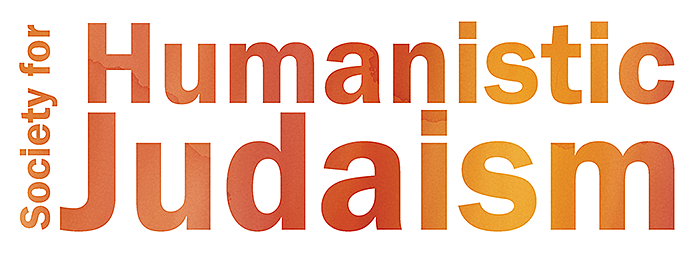
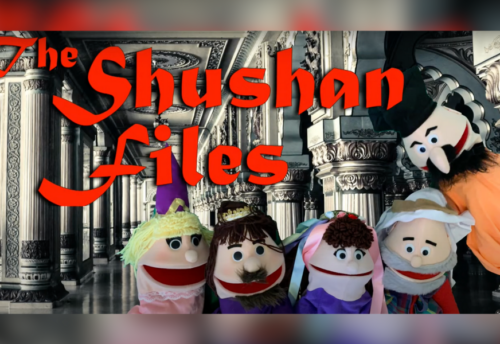
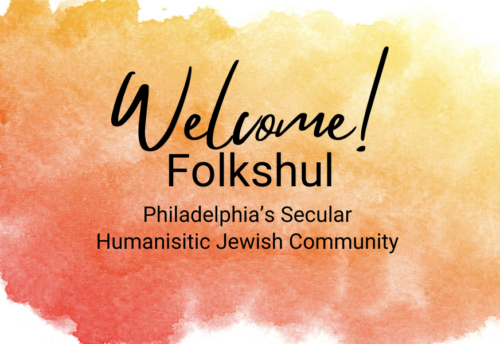
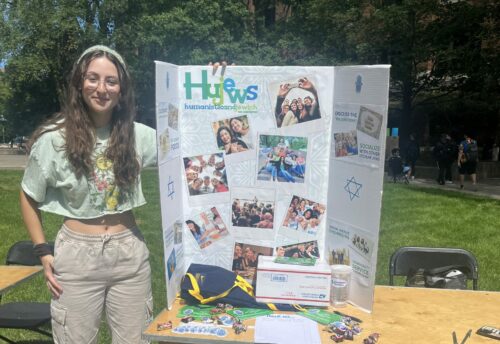
Very inspirational story, Vicki. Thank you for sharing. I will be taking my two dogs for a walk in a moment and it will be with a different frame of mind thanks to what you shared.
Thank you, Jon!
Excellent post, Vicki! You have linked our personal values with that of traditional and non-traditional Judaism in a most profound way. Thank you!